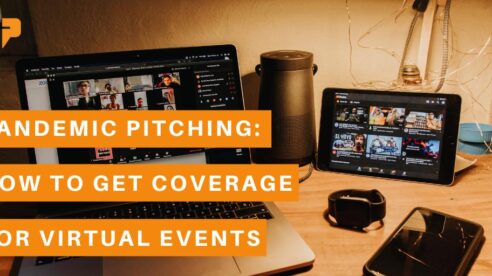Virtual events are still newsworthy these days — as long as you pitch them properly.
As we continue to work through the coronavirus pandemic, virtual events have become a part of our new normal. Events like graduations, 5k runs and concerts are now all prefaced with “virtual,” “livestream” and “tune in.”
Although we would all much rather be attending events in-person, that doesn’t mean virtual events are any less important to share with the media. In fact, the virtual factor can even make your event easier for broadcast media by providing pre-recorded videos, participating in Zoom interviews and eliminating the need for stations to send a camera crew to your event. Read on for key factors in securing coverage for pandemic-era online events.
Traditional Media Relations Still Applies
A media advisory is in every PR pro’s toolkit, and it proves its worth when it comes to virtual events. Media alerts should be short and to the point, offering a who/what/where/when bundle of information to inform the reporter why they should cover your event, and the elements of your event that are a particular visual and fit for broadcast media. This alert needs to include the link to the live event in the “where” section so the reporter can virtually attend the event, and a link where they can view the recorded event after it goes live.
Be Prepared for a Zoom Interview
Offering a spokesperson or expert gives your pitch some extra oomph, and virtual interviews offer much more flexibility for busy clients. Instead of having to take time out of their day to get to the studio, your interviewee can more conveniently schedule an interview into their hectic schedule. That being said, be prepared for this possibility, and consult with your spokesperson to ensure they are comfortable with a virtual interview and know how to use apps like Zoom before you begin pitching reporters.
President and CEO of the Mann Center for the Performing Arts, Catherine Cahill, was able to be interviewed for CBS Evening News from her home to speak about the All City Orchestra Summer Academy (ACOSA). Zoom interviews also enabled ACOSA participants to share their experience with reporter Jim Axelrod, without having to travel.
Streamline Your Media Materials
Don’t make things harder on your reporter than they have to be. Providing event information and content all in one, centralized place is crucial. In one email, you should be able to provide your reporter with all of your materials — through links. Create a Dropbox, Google Drive or other cloud storage folder with all of the video and photo content from the event. The body of your email should include a link to this folder (triple check that your sharing permissions grant access to anyone with the link), as well as any links you may have to the direct live-stream.
Cristo Rey Philadelphia High School received coverage for their virtual graduation ceremony after their pre-recorded celebration was shared with news desks through Dropbox.
https://devinepartners.com/wp-content/uploads/2020/10/File-from-iOS-9.mov
Don’t Forget Your Media Calls
Media calls are still a crucial part of pitching an event. Pre-pandemic, when most events were in-person, calling broadcast news desks was important to confirm that the desk received your media advisory, to check if a camera crew was scheduled to cover your event or to learn if your story was slated for a news segment. Even though you won’t need a camera crew for virtual events, making calls is an efficient way to communicate with the assignment desk about the status of your pitch, and it also gives you the opportunity to point out the content links in your email that may have easily been missed.
Although these strategies are important for pandemic pitching, mastering these basics will also prove helpful for when we can all reunite at in-person events once again.


